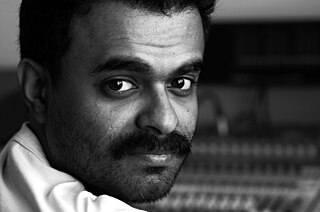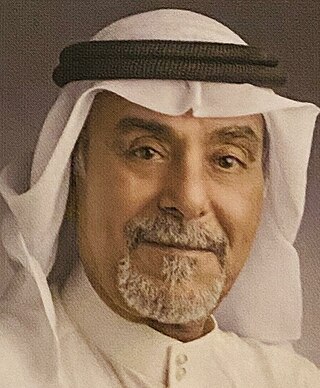
Muharraq is Bahrain's third-largest city and served as its capital until 1932 when it was replaced by Manama. The population of Muharraq in 2020 was 263,373.
Ali Al Shargawi is a leading Bahraini poet, lyricist and playwright whose work has been translated into English, German, Bulgarian, Russian, Kurdish, and French. Born in Manama in 1948, he started publishing his poetry in 1968, and quickly gained prominence in Arab newspapers and magazines.
The culture of Bahrain is part of the historical region of Eastern Arabia. Thus, Bahrain's culture is similar to that of its Arab neighbours in the Arabian Gulf region. Bahrain is known for its cosmopolitanism, Bahraini citizens are very ethnically diverse. Though the state religion is Islam, the country is tolerant towards other religions: Catholic and Orthodox churches, Hindu temples as well as a (now-defunct) Jewish synagogue are present on the island.

Ebrahim Al-Arrayedh was a Bahraini writer and poet, generally considered to be one of Bahrain's greatest poets and one of the leaders of the Bahraini literary movement in the 20th century.

The cinema of Bahrain is small as its lacks support from the government and the private sector. There are many short films produced by individual filmmakers, and about five feature films in Bahrain's history.

The following outline is provided as an overview of and topical guide to Bahrain:

Bahrain, officially the Kingdom of Bahrain, is an island country in West Asia. It is situated on the Persian Gulf, and comprises a small archipelago made up of 50 natural islands and an additional 33 artificial islands, centered on Bahrain Island which makes up around 83 per cent of the country's landmass. Bahrain is situated between Qatar and the northeastern coast of Saudi Arabia, to which it is connected by the King Fahd Causeway. The population of Bahrain is 1,501,635 as of May 14, 2023, based on elaborations of the United Nations data, of whom 712,362 are Bahraini nationals. Bahrain spans some 760 square kilometres (290 sq mi), and is the third-smallest nation in Asia after the Maldives and Singapore. The capital and largest city is Manama.

Mohammed Haddad is a Bahraini composer and music critic. He is an active artist in the music scene of Bahrain and a leading composer in the film scores of Bahraini films. He is best known for his work on the soundtrack of the critically acclaimed Bahraini motion picture A Bahraini Tale.
The 2011–12 Bahrain First Division League is the 55th edition of top-level football in Bahrain. Al-Muharraq are the defending champions. The season started on 1 December after numerous postponements to the original fixture list and finished on 4 June with the relegation/promotion playoff match.

Bassam Mohammed Al-Thawadi is a veteran Bahraini filmmaker and film director, known for producing Bahrain's first feature film, The Barrier, in 1990. Regarded as a regional pioneer in film-making, he is a founding member of the GCC Cinema Society and is also the founder and director-in-general of first Arab Cinema Festival in Bahrain. He had directed numerous short films and also commercials, educational & cultural programmes during his tenure in the Bahrain Radio and Television Corporation as well as performing in plays.
The modern Bahraini art movement emerged in the 1950s, with the establishment of an Arts and Literature club in 1952. The club served as an umbrella group for professional and amateur artists, musicians, and actors in Bahrain. In 1956, the first art exhibition was held in the Bahraini capital, Manama. Expressionism and surrealism, as well as calligraphic art are the popular forms of art in the country. Abstract expressionism has gained popularity in recent decades.
The literature of Bahrain has a strong tradition in the country. Most traditional writers and poets write in the classical Arabic style, contemporary poets that write in this style include Ali al-Sharqawi, Qassim Haddad, Ebrahim Al-Arrayedh, and Ahmad Muhammed Al Khalifa. In recent years, the number of younger poets influenced by western literature are rising, most writing in free verse or prose poetry, and often including political or personal content. Almost all publications of poetry in the country are in Arabic, with poetry rarely published in English without requiring prior translation. Ali al-Sharqawi, a decorated longtime poet, is considered by many to be the literary icon of Bahrain. The country's local writing society, the Bahrain Writers Association, was founded in 1969.

The Islamic month of Muharram is a period of mourning in Shia Islam and commemorates the death of Imam Hussain, the third Imam, and his companions at the Battle of Karbala in 680 AD. Processions called Azadari are held to commemorate and remember the events that took place, these are often organised by congregation halls known as Hussainia. Mourning climaxes on the tenth day of Muharram, Ashura. The mourning is sometimes referred to as the Remembrance of Muharram.
The 2014–15 Bahrain First Division League was the 58th edition of top level football in Bahrain. The title was won by Al-Muharraq for the 33rd time and first time since the 2010–11 Bahrain First Division League campaign. The campaign was one of the most exciting in Bahraini football history with five teams in contention until the final weeks.
The Bahraini King's Cup is a cup competition involving teams from the Bahraini Premier League and 2nd tier. Hidd SCC are the current holders of the King's Cup, having defeated Busaiteen in extra time in last year's final.
Taqi Muhammad Baharna is a Bahraini poet, diplomat and businessman. He was born in the capital of Manama. Educated in literature and economics, he has been Bahrain's ambassador to Egypt and headed Bahrain's mission to the Arab League. He has also published his poetry and literature in a number of Bahraini and Arab periodicals, and he has written several books.
Jassim Salman Al Muawda was a Bahraini educator, association football player and coach, musician, and singer.

Ibrahim Buhindi (1948) is a Bahraini contemporary journalist, poet, and playwright. He was born in Muharraq. He obtained a diploma degree in commerce from Bahrain schools. He has worked as a banking employee since 1968. He held the position of Assistant general manager, Treasury and Investment, at the National Bank of Bahrain and Kuwait. He is a member of the Bahraini Family of Writers and the Bahraini Awal Theater. He has many collections and poetry plays, in addition to several newspaper articles.
Ahmed Hassan Al-Derazi is a Bahraini professional basketball player for Manama Club, and a former player for the Bahrain national team. He previously played for Muharraq Club of the Bahraini Premier League.









